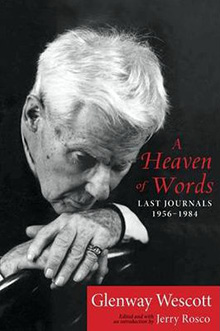 A Heaven of Words
A Heaven of Words
Last Journals, 1956–1984
by Glenway Wescott
edited by Jerry Rosco
Published by University of Wisconsin Press
Published June 28, 2013
History (memoir)
314 pgs. • Find on Amazon.com • WorldCat
Reviewed by Stephen O. Murray
November 22, 2014.
I much prefer Jerry Rosco’s edited Glenway Wescott (1901–1987) journals, under the titles Continual Lessons (1991) and A Heaven of Words to the short fiction published by the University of Wisconsin Press with “Visit to Priapus” as the title story.
Wescott sometimes realized that his journal jottings would be of greater interest than most of his fiction (though I think The Pilgrim Hawk and An Apartment in Athens quite good, and both are in print).
He wrote that his “life as subject matter is far superior to my capabilities as a writer,” recognized that a journal “is an immensity that that is always and has to be fragmentary,” and regularly chided himself at an incapacity for continuous discourse (or even steady working on a project). And he repeated Paul Valery that “talent without genius isn’t much; genius without talent is nothing at all” (and thought his talent slight).
Wescott and Christopher Isherwood were primarily responsible for getting E. M. Forster’s Maurice into print in 1971, the year after Forster’s death and 57 years after it was drafted. Wescott remarked in his journal that “there will have to be a great many more books like Maurice before the homosexual life will cease to be a mystery, with its extreme friendliness, its great gamut of emotions, its erudition of sensualities.” There have been many novels about gay men since then, though few—except for those by Allan Hollinghurst are at all like Maurice (sharing English obsessions about crossing class lines).
The sexual encounters mentioned in Wescott’s journals also seem superior to “Visit to Priapus,” and the long (open) relationship with Monroe Wheeler, which began in 1919 and continued until Wescott’s death, is more interesting even than his observations of other writers such as Katherine Anne Porter [1890–1980] and Isak Dinesen [1885–1962].
©22 November 2014

